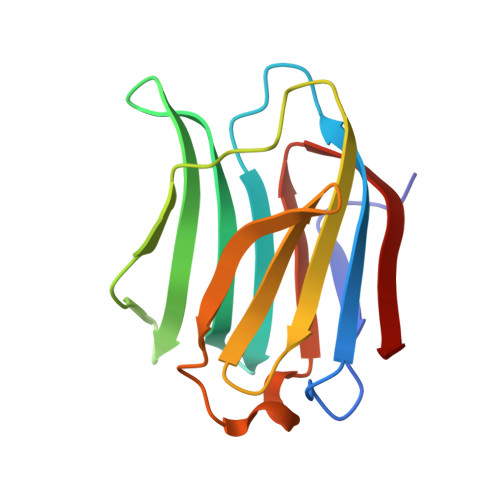Novel Selective Galectin-3 Antagonists Are Cytotoxic to Acute Lymphoblastic Leukemia.
Bum-Erdene, K., Collins, P.M., Hugo, M.W., Tarighat, S.S., Fei, F., Kishor, C., Leffler, H., Nilsson, U.J., Groffen, J., Grice, I.D., Heisterkamp, N., Blanchard, H.(2022) J Med Chem 65: 5975-5989
- PubMed: 35427125
- DOI: https://doi.org/10.1021/acs.jmedchem.1c01296
- Primary Citation of Related Structures:
7RGX, 7RGY, 7RGZ, 7RH0, 7RH1, 7RH3, 7RH4 - PubMed Abstract:
Galectin-3 is a β-galactoside-specific, carbohydrate-recognizing protein (lectin) that is strongly implicated in cancer development, metastasis, and drug resistance. Galectin-3 promotes migration and ability to withstand drug treatment of B-cell precursor acute lymphoblastic leukemia (BCP-ALL) cells. Due to high amino acid conservation among galectins and the shallow nature of their glycan-binding site, the design of selective potent antagonists targeting galectin-3 is challenging. Herein, we report the design and synthesis of novel taloside-based antagonists of galectin-3 with enhanced affinity and selectivity. The molecules were optimized by in silico docking, selectivity was established against four galectins, and the binding modes were confirmed by elucidation of X-ray crystal structures. Critically, the specific inhibition of galectin-3-induced BCP-ALL cell agglutination was demonstrated. The compounds decreased the viability of ALL cells even when grown in the presence of protective stromal cells. We conclude that these compounds are promising leads for therapeutics, targeting the tumor-supportive activities of galectin-3 in cancer.
Organizational Affiliation:
Institute for Glycomics, Griffith University, Gold Coast Campus, Queensland 4222, Australia.
















